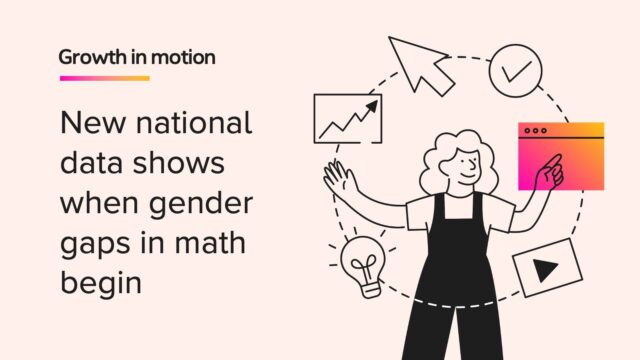
Teaching foundational reading skills continues to be one of the most significant goals of early grade teachers and reading intervention teachers. Reading proficiently is essential for all students, as reading well allows students to access content across the subject areas and learn about subject matters outside of their environment.
The modalities through which we read today extend beyond the printed page, as do the instructional approaches used in today’s English Language Arts (ELA) classrooms. The future of foundational reading and writing skill instruction is greatly expanded in a digital-first environment—an environment where teachers are central to student learning, and instruction is strongly rooted in the science of reading.
What Are Key Foundational Reading Skills?
By the time children experience reading instruction, they have spent countless hours listening and speaking, which they will use as they learn key foundational reading skills. Achieve the Core defines foundational reading skills as:
- Print concepts: includes letter recognition, features and organization of print, and one-to-one correspondence of words
- Phonological awareness: is entirely oral, focuses on the sounds of the spoken language, and includes phonemic awareness
- Phonics and word recognition: refers to learning sound and spelling patterns needed to recognize, decode (read), and encode (spell) words
- Fluency: in reading is the ability to read accurately, at an appropriate rate, and with expression

What Are Other Foundational Literacy Skills?
In addition to the four key foundational reading skills listed above, students need numerous other foundational literacy skills to become proficient. For example, a strong ELA program will include instruction that supports language comprehension, background knowledge, vocabulary, reading comprehension, writing, and speaking.
The sophistication of these skills will evolve as the students progress through school. For example, before students can effectively write a response to reading prompts, they need to have experience with print concepts, like letter recognition, handwriting, such as letter formation, and encoding (spelling). Students will also need to practice many other skills, such as listening to stories read aloud and telling stories.
Foundational Skills to Support Reading for Understanding
Teachers and families can support students as they travel through the many stages of literacy development. After an extensive review of rigorous research, the Institute of Education Sciences (IES) and the What Works Clearinghouse (WWC) produced the IES Practice Guide: Foundational Skills to Support Reading for Understanding in Kindergarten Through 3rd Grade. While the skills are similar to the key foundational reading skills above, there is some variation in their focus. Given the strong research base of this IES Practice Guide, we would be remiss not to highlight their instructional recommendations:
- Recommendation 1: Teach students academic language skills, including the use of inferential and narrative language and vocabulary knowledge.
- Recommendation 2: Develop awareness of the segments of sounds in speech and how they link to letters.
- Recommendation 3: Teach students to decode words, analyze word parts, and write and recognize words.
- Recommendation 4: Ensure that each student reads connected text every day to support reading accuracy, fluency, and comprehension.
Families are essential to supporting students’ knowledge acquisition, including ELA skills. Drawing upon the four recommendations of the IES Practice Guide, WWC created a companion document, “Tips for Supporting Reading at Home,” which offers guidance to families (and applies to classrooms as well), including:
- Have conversations before, during, and after reading together.
- Help children learn how to break sentences into words and words into syllables.
- Help children sound out words smoothly.
- Model reading fluently by practicing reading aloud with your child.
Teaching Foundational Literacy Skills
Teaching foundational literacy skills requires systematic, explicit, and diagnostic instruction. Concepts need to be taught with an evidence-based scope and sequence covering topics from the most basic to more complex, which are introduced through teacher modeling, adequate practice, and personalized feedback. Students’ understanding and skills are assessed continuously so that whole-group classwork can focus on curricular elements benefiting all students. Small-group work can provide targeted, differentiated reading instruction that accommodates the needs of students reading at various levels.
Teaching Foundational Literacy Skills with Digital Tools
The use of digital tools to support early literacy instruction has skyrocketed over the past couple of decades, particularly with the pandemic accelerating the usage of technology for all students. During whole-group instruction, many teachers can display literacy lessons on digital Smart Boards or access relevant multimedia that develop students’ vocabulary and content knowledge on a given text. Students can be broken up into literacy centers or small groups, where some students practice a given phonics or comprehension skill with personalized instruction at computer stations while others may be reading independently using audiobooks or eBooks at their reading level.

Digital library applications allow students to answer comprehension questions after reading a book and motivate them with incentives after successful completion of the books. Asynchronous online assignments can also be completed at home to further reinforce topics covered in school and improve students’ fluency through repeated reading. Adaptive online assessments and AI-driven software can serve as teachers’ assistants to free up their time so teachers can focus more closely on the instructional needs of all students. The future of teaching foundational literacy skills will be a masterful combination of in-person instruction with technology seamlessly interwoven to reinforce, personalize, and enhance the learning experience.
The foundational skills discussed above form the bedrock or the foundation to lifelong literacy. No matter where the learning takes place (in person or online), effective foundational literacy instruction requires evidence-based instructional strategies that have demonstrated positive outcomes. More than ever, it is paramount to accelerate learning and fill instructional gaps that resulted from interrupted schooling due to the pandemic years so all children can reach their goals and full potential without anything holding them back.
***
Learn more about our science of reading curriculum, an evidence-based approach to help students in their reading journeys.
Get our free Science of Reading eBook today.













